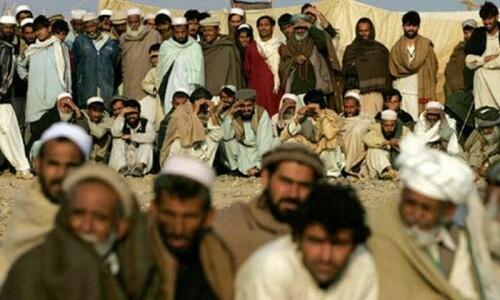 LAHORE, March 12: Human rights crusader, peace activist and wife of poet Faiz Ahmad Faiz, Alys Faiz, passed away here on Wednesday morning at the age of 88.
LAHORE, March 12: Human rights crusader, peace activist and wife of poet Faiz Ahmad Faiz, Alys Faiz, passed away here on Wednesday morning at the age of 88.
She had been unwell for some time and was confined to her house after suffering a fracture of the hipbone in a fall. She died at the Ittefaq Hospital at around 10am where she was taken for emergency treatment.
Mrs Faiz was buried in the evening in the Model Town graveyard by the side of her husband. Faiz had died on Nov 20, 1984.
Hundreds of people from all walks of life attended the funeral prayers. Prominent among them were Foreign Minister Khurshid Mehmood Kasuri, former finance minister Dr Mubashir Hasan, and PPP leader Salman Taseer. Mrs Faiz is survived by two daughters, Salima Hashmi, former principal of the National College of Arts, and Muneeza Hashmi, a senior producer at PTV in Lahore.
Born on Sept 22, 1914, in London, Alys Faiz came to India in 1938 to visit her elder sister, Christobel (Bilqees), who was married to Dr M.D. Taseer. She could not go back to her country because of World War II and decided to stay on. She married Faiz, who was teaching at the MAO College in Amritsar at that time, in October 1941.
The wedding took place in Srinagar and their nikah was solemnized by prominent Kashmiri leader Sheikh Abdullah. She was given a Muslim name, Kulsoom, when she embraced Islam at the time of her marriage, but she always remained Alys to her friends and admirers.
Alys Faiz had joined the Communist Party of Britain when she was only 16. She also served as secretary to Mr Krishna Menon, who was then in London, and took an active part in the subcontinent’s independence struggle.
She joined The Pakistan Times in 1950 and looked after the women’s and children’s sections of the newspaper. She joined the newspaper’s regular staff in 1951 after the arrest of her husband in the so-called Rawalpindi Conspiracy Case. She also started the newspaper’s reference section.
Mrs Faiz taught special children in Karachi when her family settled there in the late 1950s. She started working for Unicef when Faiz moved to Islamabad. She joined the weekly Viewpoint after the family returned to Lahore following a period living abroad in Beirut.
Dr Mubashir Hasan described Mrs Faiz as a “fighter in her own right”. “Faiz owed a great debt to her. She stood by him in the worst of times,” he said.
Ms Salima Hashmi said her mother was a rebel who never compromised on principles. She made “a tremendous sacrifice for her husband and family and submerged her identity. In spite of her parents’ insistence, she refused to leave Pakistan and join them in London with her children when our father was jailed in the conspiracy case.”
Alys was the author of two books, Dear Heart, a collection of her letters written to her husband during his years in jail in the 1950s, and Over My Shoulder, a collection of her dispatches for Viewpoint sent from Beirut at the height of the civil war.














































